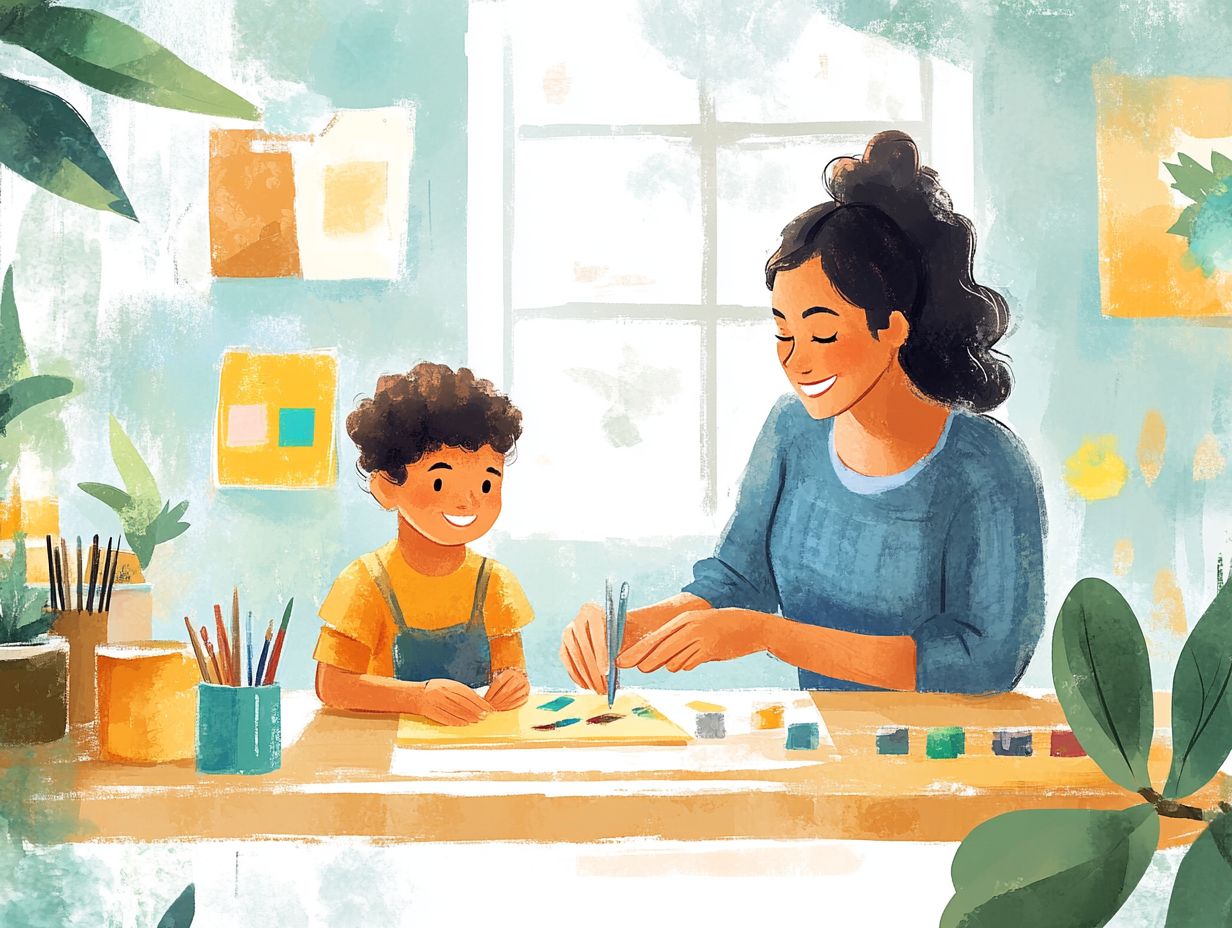How to Foster Independence While Connecting
Independence and connection are two vital elements of a fulfilling life, yet they often appear to be in conflict with one another. Balancing these aspects is crucial for personal happiness and relationship satisfaction.
This article delves into practical strategies for nurturing both qualities within yourself and in your relationships. By encouraging decision-making and embracing the space for mistakes, coupled with fostering active listening, open communication, and shared interests, you can explore how these elements can coexist in harmony.
Discover the myriad benefits that emerge when you achieve a balance between independence and connection, paving the way for personal growth, personal happiness, and deeper bonds. Join in the journey to uncover the keys to cultivating a rich, interconnected life.
Contents
- Key Takeaways:
- How Can Independence Be Fostered?
- How Can Connection Be Fostered?
- How Can Independence and Connection Coexist?
- What Are the Benefits of Fostering Independence and Connection?
- Frequently Asked Questions
- What is the importance of fostering independence while connecting?
- How can I foster independence in my child while still staying connected?
- What are some practical ways to promote independence in a relationship?
- How can fostering independence benefit a group or team dynamic?
- Is it possible to foster independence while still maintaining a strong emotional connection?
- How can I foster independence in my aging loved ones while staying connected and supportive?
Key Takeaways:
How Can Independence Be Fostered?
Fostering independence in children is an essential facet of their development, demanding your intentional guidance, a keen understanding of their individual needs, and a nurturing environment that champions emotional autonomy and personal growth.
As your children navigate the concrete operational stage as described by Piaget, your role becomes pivotal in nurturing their decision-making skills, empowering them to become self-sufficient and cultivate a robust personal identity.
This journey toward independence not only instills a deep sense of confidence within them but also lays the foundation for healthy relationships anchored in mutual respect and trust in relationships.
1. Encourage Decision Making
Encouraging decision-making in children is vital for cultivating self-sufficiency and fostering emotional autonomy. It empowers children to trust their abilities while also creating a more balanced relationship with their parents.
By allowing young ones to select their activities or manage their responsibilities, you re not just granting them freedom; you re giving them a chance to experience the consequences of their choices. Whether it s picking a weekend pastime or deciding when to tackle homework, these moments are opportunities for growth and creative thinking.
Active listening is key in this journey. When you genuinely engage with your child s thoughts and ideas, you communicate a deep respect for their opinions. This mutual respect fosters a nurturing environment where they feel confident expressing their preferences, ultimately shaping them into more skilled decision-makers and problem solvers in various situations.
2. Allow for Mistakes
Allowing children to make mistakes is essential for cultivating resilience and managing emotions. It teaches them how to manage their emotions and reinforces the idea that failure is an intrinsic part of learning and personal growth.
When children encounter setbacks, it s crucial for them to receive emotional support from their families. This nurturing environment empowers them to view challenges as opportunities for development rather than insurmountable obstacles. By navigating their emotions with your guidance, they can build confidence in their abilities and foster a stronger sense of self-worth. Your family plays a pivotal role in helping them understand that mistakes are not reflections of their worth but rather stepping stones on the path to success.
This supportive network can significantly enhance a child’s emotional management skills, nurturing a mindset that embraces determination and perseverance in the face of adversity.
3. Provide Opportunities for Growth
Providing opportunities for growth is fundamental in nurturing independence, as it allows you to engage in self-directed learning and take on age-appropriate tasks and childhood responsibilities that help shape your personal identity.
One of the most effective ways to foster this development is by involving yourself in family meals. This experience not only equips you with essential cooking skills but also promotes cooperation among family members. Family meals are endorsed by the U.S. Department of Education as beneficial for child development. Planning activities that require teamwork, such as organizing family game nights or group projects, encourages collaboration and communication.
These shared experiences lay the groundwork for healthy relationships and instill a sense of belonging, making you feel valued within your family unit. When you actively participate in these moments, you learn the importance of working together, enhancing your social skills, emotional intelligence, and maintaining friendships as well.
4. Teach Life Skills
Teaching life skills is essential for fostering independence, as it equips you with the confidence necessary to navigate challenges and ultimately achieve financial independence while staying true to your individuality.
By instilling skills such as budgeting, cooking, and time management, you lay a solid foundation that empowers you to handle future responsibilities with ease. Budgeting teaches you to manage your finances wisely. Cooking sparks creativity and self-sufficiency, allowing you to nourish your body and enjoy shared meals with others. Mastering time management can help you feel less stressed and create a balanced lifestyle.
These skills boost personal growth and improve your relationships, as well-rounded individuals like you tend to contribute positively to their communities and support their loved ones more effectively, fostering a community mindset.
How Can Connection Be Fostered?

Fostering connection within your family relationships is essential for emotional well-being. It creates an environment where open communication flourishes, empathy is nurtured, and mutual respect is cultivated, leading to trust in relationships.
This, in turn, leads to enhanced relationship satisfaction for both you and your children.
1. Active Listening
Active listening is an essential skill for nurturing connection, as it showcases your emotional support and helps establish trust while maintaining healthy boundaries and personal space in your relationships.
This technique requires you to fully concentrate, understand, and respond thoughtfully to what others are conveying, rather than simply hearing their words. By being genuinely present, you can create an environment where family members feel valued and secure enough to share their thoughts and feelings. This openness not only diminishes misunderstandings but also paves the way for healthier communication.
As you embrace active listening, you cultivate empathy and validate each other s experiences, which enhances emotional bonds and fosters a sense of belonging. Ultimately, this approach improves conflict resolution and leads to a more harmonious family dynamic.
2. Quality Time
Spending quality time together whether through family meals or shared activities is crucial for nurturing emotional support and forging lasting bonds between parents and children, encouraging child development.
Engaging in meaningful conversations during these moments allows you and your family members to express feelings and thoughts openly, reinforcing the notion that everyone is heard and valued. Activities like playing board games, embarking on nature walks, or even cooking together offer not just entertainment, but also cultivate shared interests that enhance communication and trust, fostering a strong connection.
These interactions play a pivotal role in helping children build confidence, knowing they have a robust support system behind them. Ultimately, these experiences contribute significantly to their emotional well-being, leaving a lasting impact that strengthens healthy relationships as they grow and fosters respect for individuality.
How Can Independence and Connection Coexist?
Independence and connection can beautifully coexist within family dynamics. By prioritizing respect for boundaries and establishing shared goals, you create a healthy balance between personal autonomy and relational closeness. This allows each individual to thrive while nurturing the bonds that matter most, emphasizing the importance of relationship balance and emotional autonomy.
1. Respect Boundaries

Respecting boundaries is crucial for creating healthy relationships. It honors the need for personal space and nurtures trust within the family dynamic.
Establishing and adhering to boundaries is essential for both children and parents. It cultivates a safe environment where everyone feels valued and understood.
When you recognize your child’s need for autonomy while also setting clear expectations, you foster their self-confidence and encourage open communication.
This interplay creates a solid foundation of trust. It allows your children to explore their identities while knowing that their feelings and limits are respected.
In turn, you gain a clearer understanding of your child s needs. This ultimately leads to stronger family ties and healthier interactions within the household.
This approach also fosters empathy development and trust in relationships.
Cultivating shared interests within your family can enhance relationships and support your children in maintaining friendships. It fosters a community mindset rooted in collaboration and understanding, while also aiding in the development of problem-solving skills.
When your family engages in activities together be it hiking, playing an instrument, or volunteering you create cherished memories that strengthen your bond. This collaborative experience allows for the sharing of passions and imparts essential lessons in cooperation and empathy.
Recognizing and embracing each family member’s unique preferences while pursuing common goals is vital. By supporting one another s individuality, your family can find harmony in diverse hobbies.
This forms a nurturing atmosphere that promotes personal growth and enhances your collective identity. It also supports relationship balance and maintains individuality.
Imagine the connections formed through shared pursuits! Such experiences not only forge deeper connections but also enrich your overall family dynamic, fostering a genuine sense of belonging and togetherness.
4. Open Communication
Open communication is essential for helping kids feel comfortable expressing themselves. It empowers them to express their feelings and concerns, ultimately fostering an environment of mutual respect and understanding.
To promote this kind of communication, consider implementing regular family meetings or check-ins. This structured time allows each member to share their thoughts and experiences, cultivating a safe space for dialogue.
Such meetings teach children the value of articulating their emotions and listening carefully without interrupting. They also support the safe exploration of complex ideas and emotions.
Effectively managing emotions during these discussions is crucial. It helps prevent conflicts and encourages healthy interactions. By using active listening and validating each other s feelings, families can strengthen their emotional connections.
This builds a resilient support system that underscores the importance of open communication and parental guidance in cultivating strong family dynamics.
2. Support Each Other’s Goals
Supporting each other s goals within the family is essential for helping children become stronger. It encourages their personal growth while allowing them to maintain their individuality.
When family members unite to share their aspirations, they cultivate a nurturing environment that promotes teamwork. This fosters an appreciation for diverse perspectives. By valuing each individual’s dreams, you create a foundation of emotional support that strengthens bonds and enhances self-esteem. This collaborative approach not only aids in developing critical life skills but also instills a sense of responsibility and commitment among children.
Celebrate every achievement, big or small! Each step forward reinforces the idea that success is a thrilling journey we take together. Ultimately, fostering an atmosphere where everyone feels empowered to pursue their unique paths significantly contributes to the overall resilience of the family. This nurturing environment not only supports individual needs but also sparks a child’s unique identity!
3. Find a Balance
Finding a balance between independence and connection is crucial for your relationship satisfaction. This balance allows your children to cultivate their independence while still enjoying strong, open communication with you.
To achieve this harmonious dynamic, consider implementing practical strategies that encourage both autonomy and togetherness. Establishing daily routines, like family meals or weekend outings, creates opportunities for meaningful interactions while empowering your children to take responsibility for their own tasks.
Allowing your children the freedom to make choices whether in their daily activities or through age-appropriate decision-making helps them build confidence. Promoting open dialogue by regularly checking in on their emotional well-being helps reinforce strong connections while respecting each individual s journey toward independence. This approach fosters confidence building and respect for individuality.
What Are the Benefits of Fostering Independence and Connection?
Fostering both independence and connection in children provides a wealth of benefits. You can expect to see improved self-esteem, stronger relationships, and enhanced personal growth. These qualities ultimately contribute to a more fulfilling life for them. This holistic approach also supports empathy development and healthy boundaries.
1. Improved Self-Esteem
Improved self-esteem stands out as one of the most remarkable benefits of fostering independence. It nurtures emotional autonomy and builds your child s confidence in their abilities and self-worth.
When you encourage your child to make their own choices, they begin to trust their instincts and embrace whatever outcomes arise, whether positive or negative. This journey not only helps in developing critical thinking skills but also reinforces their capability to navigate life’s challenges. By recognizing mistakes as vital learning opportunities, they cultivate resilience and a stronger sense of identity.
Ultimately, empowering young individuals in this manner instills a profound understanding of their intrinsic value. They realize their opinions matter, and personal growth flourishes when they take risks and make decisions with confidence. This approach supports self-sufficiency and decision making.
2. Stronger Relationships
Fostering independence alongside connection leads to stronger relationships within your family. It cultivates mutual respect and encourages healthy boundaries that benefit everyone involved.
This crucial dynamic enables each individual to thrive while still feeling supported and cherished. For example, when you encourage siblings to pursue their own interests and hobbies, they develop a sense of identity and self-worth that nurtures respect for one another’s choices.
As a parent, embracing your children s independence by allowing them to express their opinions creates a healthier communication environment. This ultimately results in a more open family dialogue. By establishing clear boundaries like designating family time versus personal space you allow each member to appreciate their connections while enjoying the freedom to grow individually. This leads to deeper, more meaningful relationships all around. This approach supports healthy relationships and mutual respect.
3. Increased Personal Growth

Increased personal growth naturally arises when you foster both independence and connection. As children embrace emotional autonomy, resilience, and self-directed learning throughout their development, they embark on a remarkable journey.
By cultivating their ability to think critically and make decisions independently, young individuals not only enhance their self-esteem but also lay a solid foundation for navigating future challenges. This dual approach enables them to forge meaningful relationships, which are essential for developing emotional intelligence. These connections offer vital support and encouragement, reinforcing their resilience when they encounter setbacks.
Ultimately, the interplay between emotional autonomy and strong social bonds equips them with the necessary tools for lifelong learning. This empowers them to adapt, innovate, and thrive in a constantly changing world. This approach also supports creative thinking and problem-solving skills.
Frequently Asked Questions
What is the importance of fostering independence while connecting?
Fostering independence while connecting helps individuals develop a sense of self and self-reliance, while also promoting healthy relationships with others. This approach supports self-sufficiency and empathy development.
How can I foster independence in my child while still staying connected?
Encourage your child’s autonomy by giving them age-appropriate responsibilities and gradually increasing their independence. At the same time, maintain open communication and spend quality time together to stay connected. This approach fosters decision making and childhood responsibilities.
What are some practical ways to promote independence in a relationship?
Set boundaries and respect each other’s personal space, encourage and support each other’s individual interests and goals, and communicate openly and honestly. This approach fosters relationship balance and autonomy in relationships.
How can fostering independence benefit a group or team dynamic?
Fostering independence within a group or team can lead to increased creativity, problem-solving skills, and self-motivation, resulting in a more efficient and productive group dynamic. This approach supports community mindset and shared goals.
Is it possible to foster independence while still maintaining a strong emotional connection?
Yes, by promoting and respecting each other’s individuality, setting healthy boundaries, and communicating openly and honestly, it is possible to foster independence while maintaining a strong emotional connection. This approach supports mutual respect and independence in love.
How can I foster independence in my aging loved ones while staying connected and supportive?
Encourage your loved ones to maintain their independence by involving them in decision-making processes, respecting their choices and opinions, and offering support and assistance when needed. This approach supports financial independence and gradual independence.







